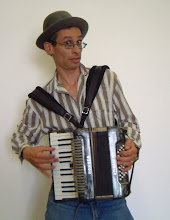They say the Eskimo has forty-three different words
for “snow”. This may be an exaggeration, but it illustrates the point that a
language will evolve to reflect the things that matter to a particular society.
In this light, it is fitting that the Jews should have a special word to denote
one who has lost his possessions in a fire: accordingly, from the Hebrew, we have
in Yiddish the word nisraph.
A
Nisraph is the title of a humorous piece by Sholom Aleichem.
I have translated here a short excerpt:
“I come from the village of Boslov. A nice
little place. The kind of place where you show up with your pockets full and
leave with your pockets empty. You know how they send people to Siberia when
they want to punish them? Better they should save the trainfare and send them
to us in Boslov instead. We'll know how to treat him. First we'll set him up in
a little shop, then we'll give him a
line of credit so he can fill it up with merchandise, and then, when his shop
burns down leaving him with nothing but the shirt on his back...we'll jump up
and down and point our fingers at him, and shout: "Jewish Lightning!
Jewish Lightning!"
Now, at some time in our lives, most of us have
heard it said that Jews burn down their stores to collect the insurance money. We
rightly consider this accusation to be just another vicious anti-Semitic
slander. But if you’re like me, you probably thought that it was a New World invention;
a sort of milder 20th-century adaptiation of the classic Blood
Libel, a fable which might have played in Kiev or Odessa but would have been a
little too medieval-sounding to attract much credibility in Chicago or New
York. Nevertheless, it’s clear from the above passage that we carried this
stigma with us even in the Old World.
So how does such an anti-semitic slur come to be the
topic of a satirical piece by Sholom
Aleichem? To understand this, we must delve into the original Yiddish text. Now,
"Jewish Lightning" is admittedly a very picturesque expression; but
of course, that's not what Sholem Aleichem uses in the original. The expression
he uses is so Jewish and so quintessentially Yiddish that it
deserves a full explanation.
"Borei me-orei ha-eish" means, literally, "blessed be the kindling of the fire". It is from the prayer recited on Saturday night for the lighting of the Havdallah candles, marking the end of the Holy Sabbath and the return of the Gray Week. Now, the Bible is often praised for its poetry, but the fact is in the original Hebrew, the poetry consists almost entirely of the use of imagery and metaphor. Actual rhyming poetry, and especially rhymes combined with metrical rhythm, is so rare that one has to consider its occurence to be almost accidental. And yet those instances of accidental rhyme and rhythm are some of the most compelling lines from the Bible and from the prayer liturgy. "The mighty hand and outstretched arm: yad khazaka u-vizroa netuya." "Borei me-orei ha-eish" is certainly another such instance.
Furthermore, one can readily see how the magnificent roaring flame of the triple-wicked Havdallah candle, so unlike the steady, modest glow of the ordinary Friday-night Sabbath candles, would have inspired in the imagination of the Jewish Merchant of Old Russia nothing so much as the image of a warehouse, chock full of merchandise and insured to the hilt, going up in flames. We are, after all, a poetic race if nothing else.
Which brings me to my final point: if we are allowed to think that as a race, we Jews are smarter than everyone else (don't deny it! you know we do!)...then aren't we ALSO allowed to admit the possibility of other, less praiseworthy tendencies? It's nothing to hide or be ashamed of...it's just one more aspect of the complicated, intricate enigma that is who we are.
"Borei me-orei ha-eish" means, literally, "blessed be the kindling of the fire". It is from the prayer recited on Saturday night for the lighting of the Havdallah candles, marking the end of the Holy Sabbath and the return of the Gray Week. Now, the Bible is often praised for its poetry, but the fact is in the original Hebrew, the poetry consists almost entirely of the use of imagery and metaphor. Actual rhyming poetry, and especially rhymes combined with metrical rhythm, is so rare that one has to consider its occurence to be almost accidental. And yet those instances of accidental rhyme and rhythm are some of the most compelling lines from the Bible and from the prayer liturgy. "The mighty hand and outstretched arm: yad khazaka u-vizroa netuya." "Borei me-orei ha-eish" is certainly another such instance.
Furthermore, one can readily see how the magnificent roaring flame of the triple-wicked Havdallah candle, so unlike the steady, modest glow of the ordinary Friday-night Sabbath candles, would have inspired in the imagination of the Jewish Merchant of Old Russia nothing so much as the image of a warehouse, chock full of merchandise and insured to the hilt, going up in flames. We are, after all, a poetic race if nothing else.
Which brings me to my final point: if we are allowed to think that as a race, we Jews are smarter than everyone else (don't deny it! you know we do!)...then aren't we ALSO allowed to admit the possibility of other, less praiseworthy tendencies? It's nothing to hide or be ashamed of...it's just one more aspect of the complicated, intricate enigma that is who we are.

No comments:
Post a Comment